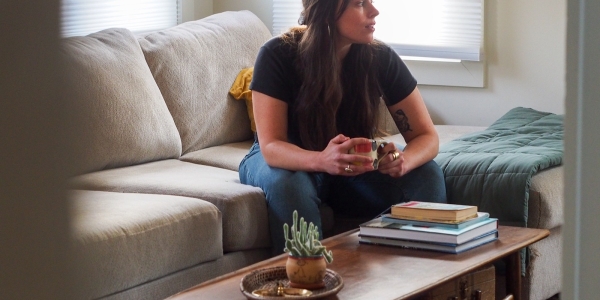
When Christine Hill bought her first home in Burlington, Vt., last year, she knew it would be hard to do it on her own. She was single and trying to buy in a competitive market; prices were rising all over the country; and she certainly didn’t have enough capital to compete with the all-cash buyers who were becoming more common. Still, Hill had always dreamed of owning her own home. It would provide stability and, she had been told, a path to building wealth.
But this past year has shown just how taxing it can be to be single and trying to achieve the American Dream.
Hill put around $22,000 down on a two-bedroom home, which she says was most of her life savings. Her monthly mortgage payment is over $1,000 more than what her rent was. And then there are the renovations. Real estate experts typically advise to plan for surprise expenses when you buy a home; there’s always a new project to undertake. Still, Hill has spent around $30,000 remodeling the first floor in just the first year of ownership—a lot of money, even if you’re expecting the unexpected.
To complicate matters, Hill didn’t have many belongings. She and her partner of four years split when she started her home-buying search; they previously lived together, and most of the kitchen equipment and utensils were his. When she moved in, she didn’t own pots, pans, plates, or even a can opener.
If she was getting married or having a child, she’d be able to create a registry and benefit from the generosity of family and friends. But she was frustrated that there was no way for her to celebrate after reaching arguably just as big a life milestone, albeit one that didn’t involve anyone else. She posted a video on TikTok to hash out her feelings with a community she knew would understood.
“I’m about to go from $800 to $2,350 for my mortgage, and there’s zero social justification for me to ask for anyone to help,” Hill tells Fortune. But “I will never need help more than I do right now.” After she posted the video, some commenters encouraged her to create a registry; she did and received two packages.
It was after she posted a video of herself opening those two packages that what she called her Single Bitch, New House Registry really took off. Her female followers rallied to support her, sending her a blender, measuring cups and spoons, and pans, among many other home basics.
“I ended up getting around $4,000 worth of things sent to me by strangers on TikTok,” she says. “The main demographic was women in their forties to sixties who had done hard things and wished that they had had the ability to call on people for help.”
The cost of being single
Hill’s story resonated with her followers, many of whom are women, because it emphasized how hard it can be to live and try to flourish in a society largely set up for couples and families. There are the tax breaks and other enhanced government benefits, and spouses can get health insurance through the other’s employer, to name a few privileges. And while the current cost-of-living crisis is tough on everyone, it can be doubly so on singles who don’t have a partner with whom to split bills and skyrocketing rent and housing payments.
That’s a big problem when a rising share of U.S. adults are living on their own, and for longer. Almost 40% of adults 25 to 54 were unpartnered in 2019, according to a Pew Research Center analysis of U.S. Census Bureau data, compared to 29% in 1990.
And that has profound effects on the economy as a whole. Unpartnered adults often have worse social and financial outcomes than those who are married or cohabiting. They have lower average earnings and are less likely to be employed.
Men are now more likely to be unpartnered than women, according to Pew, and it isn’t easy on them. But women also earn less than men, on average—and women of color earn even less—and live longer. They are also more likely than men to be single, whether that be divorced or widowed, in old age.
Hill’s registry was just one way for her to shift societal expectations of when it’s okay to ask for help. She’s not alone, either. More people are creating registries for divorce and to celebrate their choice to be child-free.
The simple fact that Hill could cook a normal meal in her home was life-changing, she says. The generosity brought her to tears.
“As we get older, there just aren’t opportunities to celebrate or support the accomplishments and life transitions of single people the way there are for marrying [and] child-having people,” she says. “It really came from a place of, ‘We have to support one another.'”





